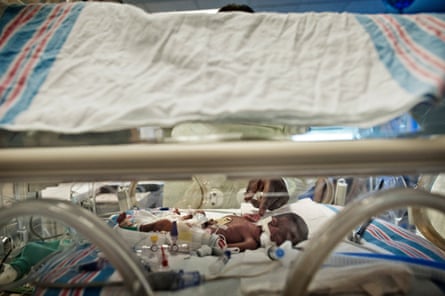The Trump administration’s shakeup of the Centers for Disease Control and Prevention (CDC) has forced Mississippi to stop gathering critical data on women’s experiences before, during and after pregnancy – even as the state recently declared a public health emergency over its surging infant mortality rate.
Mississippi has suspended data collection for Pregnancy Risk Assessment Monitoring System (Prams), a national database that has been integral to policymaking on maternal and infant health for nearly four decades, the Guardian has learned.
Prams functions as a partnership between state-level health officials and a little-known but influential CDC agency called the Division of Reproductive Health, which has lost most of its staff – nearly 100 people – in the Trump administration’s purges of federal workers, according to records in a lawsuit filed by several Democratic-led states over the purges.
As a result, many of the division’s projects, including Prams, have sputtered to a halt, the lawsuit alleges.
The division will likely be unable to obtain accurate nationwide data on maternal and infant health in 2024, 2025 and 2026, an unnamed CDC staffer said in one declaration included in the lawsuit.
Researchers rely on Prams data to test out potential health interventions to improve maternal and child health, while states use it to make the case for federal funding for programs that aim to reduce infant deaths, improve care for women and help children with special needs.
The changes at the division forced Mississippi to terminate its 2024 Prams data collection and has delayed its 2025 collection, a Mississippi health department spokesperson said in an email. The spokesperson also attributed the work stoppage to “a federal directive” issued in January, but did not answer follow-up questions about the nature of that directive. In the meantime, the spokesperson said, the department is at work analyzing its existing Prams data.
In response to several questions for this story, a CDC spokesperson said that states received funding for 2025 data collection in May, to begin collecting data this summer, and that the agency “plans to support Prams data management activities” for the 2024 and 2025 data. Neither the CDC nor Mississippi responded to follow up questions clarifying why the data collection has been stopped.
Mississippi declared a public health emergency in August after its health department found that the state infant mortality rate had increased in 2024 to 9.7 deaths per 1,000 live births – its highest point in more than a decade. Between 2014 and 2024, more than 3,500 babies died before their first birthday.
While researchers can still use birth and death certificates to examine general trends in infant mortality, those records lack the granular detail tracked by Prams.
“Prams is basically the only state and national dataset that gets data every year about the health of pregnant and postpartum women and their infants,” said Rita Hamad, an associate professor of social and behavioral sciences at the Harvard TH Chan School of Public Health.
The lawsuit by Democratic-led states allege that, although some “contract reviewers” recently embarked on data collection for Prams, “their efforts were unsupervised and uncoordinated leading to data collection that is unusable by plaintiff states.” The disintegration of the Division of Reproduction Health means there is no one left to oversee Prams and shape the data into working condition, one former CDC employee told the Guardian.
“If you don’t maintain the staff, the funding isn’t going to be effectively used,” the employee said. “Perinatal epidemiologists are not a dime a dozen. Trying to fire them and yet still maintain a healthy society for moms and babies is just not possible.”
‘What are we changing for families?’
In its declaration that Mississippi’s infant mortality rate constituted a public health emergency, the state health department said it would work to increase counties’ ability to offer prenatal care, educate families on safe sleep practices for infants and strengthen a program that provides home visits to expectant moms. The declaration does not unlock extra funding; a department spokesperson called it “an administrative tool to help us expedite setting the plans and resources in place”.
“Part of the plan includes a comprehensive, large-scale public relations campaign that is in the works,” the spokesperson added.
But advocates believe that expanding pre- and postnatal care, while helpful, is not enough.

The Trump administration plans to cut more than $1tn from Medicaid, the US government insurance program for low-income people. Cassandra Welchin, executive director of the advocacy group Mississippi Black Women’s Roundtable, wants Mississippi to devote more state dollars to offsetting those cuts. Medicaid pays for nearly 60% of births in Mississippi, a share that is about 20% higher than the national average.
She also wants Mississippi, which currently abides by the US federal minimum wage of $7.25 per hour, to set a higher minimum wage.
“It’s a poverty issue,” Welchin said of the infant mortality crisis. “If folks have higher incomes, they’re better able to take care of themselves and their families.”
The Mississippi health department’s ability to address one of the leading causes of infant mortality in Mississippi, congenital anomalies, will also likely be hobbled by the state’s near-total abortion ban. Research has repeatedly linked abortion bans to higher infant mortality, in part because they force people to carry pregnancies with congenital anomalies that they otherwise would have ended.
Advocates are calling on the state to better address the racial disparities in infant mortality. In Mississippi, as in the rest of the US, Black people face disproportionately high rates of infant mortality. The state’s health department found that, in 2024, the infant mortality rate among white people was 5.8 deaths per 1,000 live births. Among Black individuals, it was 15.2.
Nikeitra Burse leads Six Dimensions, a Mississippi public health company, and sits on the state’s maternal mortality review committee. Her aunt and sister-in-law died within weeks of giving birth, while her sister was diagnosed with preeclampsia and ultimately gave birth to a son who died at eight months old. All were Black.
“These are women who had education. My aunt had a master’s degree. They had access to healthcare. They had family advocates,” Burse said. “They had all the boxes that America wants you to check off so that you can navigate this system in a healthy way, but they still were not able to get out of the system healthy.”
But experts say Trump’s crusade against diversity, equity and inclusion (DEI) is hampering efforts to fight racial disparities in public health. In Mississippi, government records show, the administration terminated a National Institutes of Health (NIH) grant that funded a “partnership to optimize equity in maternal and infant health”. At the time of the termination, records indicate that the NIH still owed hundreds of thousands of dollars to the grant recipient Delta Health Alliance, a non-profit focused on improving the lives of people in the Mississippi Delta, a region whose population is predominantly Black. (The organization didn’t reply for a request for comment on the termination.)
Ultimately, Hamad believes the attacks on Prams will lead to higher maternal and infant mortality and morbidity.
“We don’t have ways to track the risk factors and we can’t study the policies to fix the problems,” she said. “It’s really gonna be a catastrophe moving forward.”

 German (DE)
German (DE)  English (US)
English (US)  Spanish (ES)
Spanish (ES)  French (FR)
French (FR)  Hindi (IN)
Hindi (IN)  Italian (IT)
Italian (IT)  Russian (RU)
Russian (RU)  3 hours ago
3 hours ago
























Comments